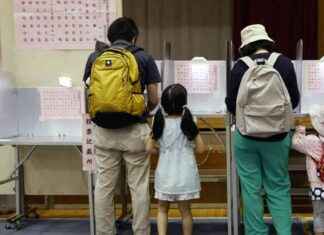For decades, anonymous sperm donation in Japan has been practiced in a great legal vacuum. A bill to be submitted to Parliament by the end of this year aims to legally frame the procedure for the first time.
However, the preliminary text consulted by AFP plans to reserve access to sperm donations to married couples, and therefore heterosexual, because Japan does not recognize same-sex unions.
This would “rob women – whether in a couple or single – of their reproductive rights and their desire to bear and raise children”, indignant Ms. Nagamura, 39.
At present, Japanese medical establishments offering artificial insemination generally follow recommendations from the Japanese Society of Obstetrics and Gynecology, which already advises that the procedure be reserved for married couples.
The principles of this medical society are not binding, but have enough weight for very few doctors to agree to help lesbian couples or single women in their plans for a child.
If these rules were to be enshrined in law, “the few clinics that accepted us will no longer be able to do so”, laments Ms. Nagamura.
She and her partner Mamiko Moda, 42, also fear that the future law will one day stigmatize their ten-month-old son, conceived by artificial insemination with the sperm of one of their friends.
Although he was born before this law, “the impression that we have done something wrong, that this child is somehow illegal, could emerge” in the future, worries Ms Moda.
– Risky informal channels –
Kozo Akino, a parliamentarian from the conservative right-wing coalition in power who participated in the bill, believes that the rights of children are better protected if their parents are legally married.
“Assisted reproductive technologies should not be used at the expense of the well-being of children,” the elected official told AFP.
Doctors also believe that the law will make the use of sperm donations more accepted in Japanese society.
Japanese medical establishments offering this artificial insemination service have faced a shortage of sperm donations, since donors were informed a few years ago that their anonymity was likely one day to be challenged in court by their descendants.
Women and lesbian couples are already turning to non-medical sperm donations, to avoid the cumbersome nature of existing procedures.
A simple search on Twitter reveals hundreds of Japanese accounts praising the physical appearance, the diplomas or the health of men who say they are ready to offer their sperm, via samples or sexual intercourse.
Many don’t ask for any money, other than paying for their transportation costs. This fuels doubts about their real motivations, with some accusing them of only looking for sex.
“It’s like donating blood,” said one of these volunteers, wishing to remain anonymous. “I happen to have a healthy body, so why not use it for a good cause?”
However, these online offers raise serious health safety issues, as the profiles of donors in terms of sexually transmitted or hereditary diseases cannot be verified.
Ms Nagamura fears that the use of these risky routes will increase with the future law. “Some will do anything to have children,” she warns. “It’s not that easy to give up having one.”








